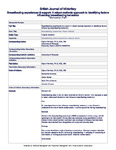Breastfeeding experiences & support: A mixed-methods approach to identifying factors influencing breastfeeding behaviour
| dc.contributor.author | Norman, Alyson | |
| dc.contributor.author | Mortimer, S | |
| dc.contributor.author | Percuklievska, N | |
| dc.contributor.author | Ferrario, H | |
| dc.contributor.author | Baptie, G | |
| dc.date.accessioned | 2022-02-18T10:15:22Z | |
| dc.date.issued | 2022-04-02 | |
| dc.identifier.issn | 0969-4900 | |
| dc.identifier.issn | 2052-4307 | |
| dc.identifier.uri | http://hdl.handle.net/10026.1/18824 | |
| dc.description.abstract |
Background Breastfeeding rates at 6 months in the UK have remained low in recent years, highlighting a need to better understand the factors that influence breastfeeding behaviour. Aim To investigate factors that influence breastfeeding behaviour in the UK and to understand the role of health professionals in promoting and facilitating breastfeeding. Methods Participants with breastfeeding experience (n=1505) completed an online survey, with 30 agreeing to be interviewed. Survey data were analysed using quantitative content analysis and a mixed thematic approach was employed to analyse interview data. Themes were derived from triangulation of survey and interview data. Results The survey identified a range of feeding complications. Thematic analysis identified four themes related to factors influencing breastfeeding: attitudes, availability of information, birthing experience and maternal mental health. Conclusions Healthcare professionals play an important role in the decision to breastfeed. It is essential that appropriate support and information is made available from early in pregnancy and throughout the breastfeeding journey. Particular support and advice is needed for those who have experienced traumatic births or are struggling with poor mental health. | |
| dc.format.extent | 190-201 | |
| dc.language | en | |
| dc.language.iso | en | |
| dc.publisher | Mark Allen Healthcare | |
| dc.subject | Reproductive health and childbirth | |
| dc.subject | Generic health relevance | |
| dc.subject | Mental health | |
| dc.title | Breastfeeding experiences & support: A mixed-methods approach to identifying factors influencing breastfeeding behaviour | |
| dc.type | journal-article | |
| plymouth.issue | 4 | |
| plymouth.volume | 30 | |
| plymouth.publication-status | Published | |
| plymouth.journal | British Journal of Midwifery | |
| dc.identifier.doi | 10.12968/bjom.2022.30.4.190 | |
| plymouth.organisational-group | /Plymouth | |
| plymouth.organisational-group | /Plymouth/Faculty of Health | |
| plymouth.organisational-group | /Plymouth/Faculty of Health/School of Psychology | |
| plymouth.organisational-group | /Plymouth/REF 2021 Researchers by UoA | |
| plymouth.organisational-group | /Plymouth/REF 2021 Researchers by UoA/UoA04 Psychology, Psychiatry and Neuroscience | |
| plymouth.organisational-group | /Plymouth/Research Groups | |
| plymouth.organisational-group | /Plymouth/Research Groups/Centre for Brain, Cognition and Behaviour (CBCB) | |
| plymouth.organisational-group | /Plymouth/Research Groups/Centre for Brain, Cognition and Behaviour (CBCB)/Behaviour | |
| plymouth.organisational-group | /Plymouth/Users by role | |
| plymouth.organisational-group | /Plymouth/Users by role/Academics | |
| dcterms.dateAccepted | 2022-02-16 | |
| dc.rights.embargodate | 2022-5-28 | |
| dc.identifier.eissn | 2052-4307 | |
| rioxxterms.versionofrecord | 10.12968/bjom.2022.30.4.190 | |
| rioxxterms.licenseref.uri | http://www.rioxx.net/licenses/all-rights-reserved | |
| rioxxterms.type | Journal Article/Review |


